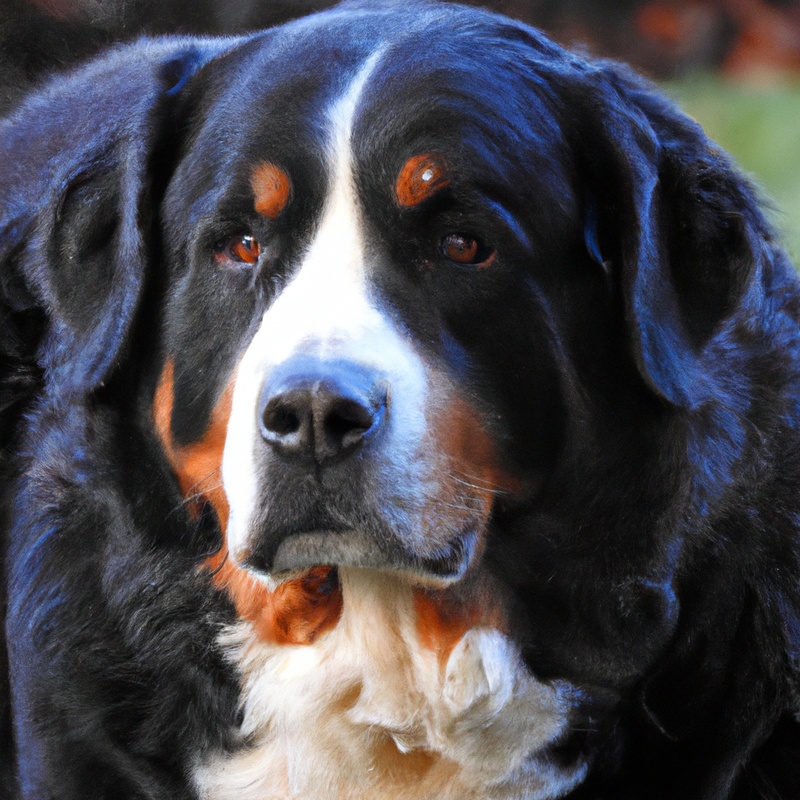What Is The Average Lifespan Of a Bernese Mountain Dog?
Key Takeaways:
- The average lifespan of a Bernese Mountain Dog is typically between 6 to 8 years.
- Some Bernese Mountain Dogs may live longer than average, while others may have shorter lifespans.
- Factors such as genetics, diet, exercise, and overall health can influence the lifespan of a Bernese Mountain Dog.
- Regular veterinary care and a healthy lifestyle can help maximize the lifespan of a Bernese Mountain Dog.
Have you ever wondered how long your furry companion will be by your side?
When it comes to Bernese Mountain Dogs, their lifespan holds the key to the many golden moments you’ll spend together.
As an expert in canine health, I’ve delved into the factors that influence the lifespan of these gentle giants.
From genetics and hereditary factors to nutrition and exercise, there are several elements that come into play.
In this article, I’ll uncover the average lifespan of a Bernese Mountain Dog, explore the factors that contribute to individual variations, and reveal how you can ensure a long, healthy life for your four-legged friend.
So, stay tuned and let’s embark on this fascinating journey together!
| Bernese Mountain Dog Lifespan | Average Lifespan |
| Male | 6-8 years |
| Female | 6-8 years |
Factors influencing the lifespan of a Bernese Mountain Dog
Genetics and hereditary factors
The lifespan of a Bernese Mountain Dog is influenced by genetics and hereditary factors. These factors can affect the dog’s overall health and determine how long they live.
Some genetic conditions that can impact their lifespan include cancer, hip dysplasia, and certain heart diseases.
Breeders play a crucial role in minimizing these risks by conducting health screenings and selecting breeding pairs with good genetic backgrounds. By breeding responsibly, we can help increase the chances of a longer, healthier life for Bernese Mountain Dogs.

Health and lifestyle considerations
Health and lifestyle considerations play a vital role in determining the lifespan of a Bernese Mountain Dog.
Here are a few important factors to keep in mind:
- Regular veterinary care: Ensuring your dog receives regular check-ups and vaccinations can help prevent and detect any potential health issues early on.
- Balanced diet: Providing a nutritious diet that meets the specific needs of a Bernese Mountain Dog can support their overall health and longevity.
- Regular exercise: Giving your dog plenty of opportunities for exercise and mental stimulation helps maintain a healthy weight and prevents obesity-related health problems.
- Environmental factors: Providing a safe and comfortable living environment free from excessive heat or cold can contribute to the well-being of your Bernese Mountain Dog.
- Grooming and hygiene: Regular grooming, including brushing their double coat and cleaning their ears, can help prevent skin conditions and infections.
- Socialization and mental stimulation: Dogs thrive on social interactions and mental stimulation. Ensuring your Bernese Mountain Dog gets plenty of opportunities for play, training, and socialization with both humans and other dogs promotes their overall well-being.
Remember, each dog is unique, and individual factors such as genetics and underlying health conditions can also influence their lifespan.
So it’s important to work closely with your veterinarian to ensure your Bernese Mountain Dog receives the best possible care based on their specific needs.
Nutrition and exercise
Nutrition and exercise are key factors in determining the lifespan of a Bernese Mountain Dog.
Providing a balanced and nutritious diet is essential to keep them healthy and maintain their weight.
This includes feeding them high-quality dog food, avoiding excessive treats, and consulting with a veterinarian for specific dietary recommendations.
Regular exercise is also crucial for their overall well-being, as it helps prevent obesity and promotes good cardiovascular health.
Engage them in daily walks, play sessions, and activities suitable for their size and energy levels.

Veterinary care and preventive measures
Veterinary care and preventive measures are essential for maintaining the health and extending the lifespan of your Bernese Mountain Dog. Regular check-ups with a veterinarian help identify any potential health issues early on.
Vaccinations protect against common diseases, while flea and tick prevention products keep parasites at bay.
Dental care, including regular brushing and professional cleanings, can prevent dental diseases. A balanced diet and regular exercise are also crucial for your dog’s overall well-being.
Lastly, spaying and neutering can help prevent certain reproductive health problems.
Remember, preventive measures can go a long way in ensuring a happy and healthy life for your beloved Bernese Mountain Dog.
Environmental factors
Environmental factors play a significant role in the lifespan of a Bernese Mountain Dog.
Here are some key factors to consider:
- Diet: Providing a balanced and nutritious diet is essential for a healthy dog. Proper nutrition can support their overall health and longevity.
- Exercise: Regular exercise helps keep your Bernese Mountain Dog physically and mentally stimulated. It can promote cardiovascular health and maintain a healthy weight, contributing to a longer lifespan.
- Living conditions: A safe and comfortable environment is important for your dog’s well-being. Ensure they have adequate shelter, protection from extreme temperatures, and a secure area to play and exercise.
- Veterinary care: Regular check-ups with a veterinarian and preventive care, such as vaccinations and parasite control, are crucial for maintaining your dog’s health and detecting any potential issues early on.
- Stress levels: Minimizing stress in your Bernese Mountain Dog’s life can have a positive impact on their overall health and lifespan. Providing a calm and predictable routine and avoiding excessive exposure to stressful situations can help.
Remember, these are just a few environmental factors that can influence your Bernese Mountain Dog’s lifespan.
Providing a loving and nurturing environment, along with proper care, can greatly contribute to their overall well-being and longevity.
Average lifespan of a Bernese Mountain Dog
Range of lifespans observed
The range of lifespans observed in Bernese Mountain Dogs can vary, but on average, they live between 6 and 8 years. However, it’s important to note that some Bernese Mountain Dogs may live shorter lives, while others may live longer.
Factors such as genetics, overall health, diet, exercise, and quality of care can all impact a dog’s lifespan.
Regular veterinary check-ups, a balanced diet, and providing a loving and stimulating environment can help maximize the lifespan of your Bernese Mountain Dog.
Factors contributing to individual variations
The average lifespan of a Bernese Mountain Dog can vary from dog to dog, and there are several factors that contribute to these individual variations.
Some of these factors include genetics, diet and nutrition, exercise and physical activity levels, overall health care and veterinary attention, and environmental factors such as living conditions and exposure to pollutants or toxins.
It’s important to note that while these factors can influence lifespan, they are not the sole determinants and each dog is unique in their own way.
Impact of breed-specific health issues
Breed-specific health issues can significantly impact the lifespan of a Bernese Mountain Dog.
These majestic dogs are prone to certain conditions such as cancer, hip dysplasia, and bloat.
These health issues can cause pain, discomfort, and reduced mobility, which can shorten their lifespan.
Regular vet check-ups, a balanced diet, exercise, and early detection of symptoms are essential for managing breed-specific health issues and giving your Bernese Mountain Dog the best chance at a longer, healthier life.

How to promote a long and healthy lifespan for a Bernese Mountain Dog
Choosing a reputable breeder
Choosing a reputable breeder is essential when looking for a Bernese Mountain Dog. Here are some key points to consider:
- Research: Take the time to research different breeders, their reputation, and their breeding practices. Look for breeders who are dedicated to the breed’s health and well-being.
- Health Testing: A reputable breeder should perform health tests on their breeding dogs to ensure they are free from genetic diseases commonly found in Bernese Mountain Dogs.
- References: Ask for references from previous puppy buyers or reputable dog organizations that can vouch for the breeder’s credibility.
- Meeting the Breeder: Take the opportunity to meet the breeder in person, visit their facility, and interact with their dogs. This will give you a better understanding of their breeding program and the conditions in which the dogs are raised.
- Contract and Guarantees: A responsible breeder will provide a written contract and health guarantees for the puppies they sell.
Remember, choosing a reputable breeder will greatly increase the chances of bringing home a healthy and well-adjusted Bernese Mountain Dog.
Providing proper nutrition and exercise
Proper nutrition and exercise are essential for promoting a long and healthy lifespan for your Bernese Mountain Dog.
When it comes to nutrition, make sure to feed your dog a high-quality, balanced diet appropriate for their age and activity level.
Provide them with fresh water at all times.
Regular exercise is also crucial for their physical and mental wellbeing.
Take them for daily walks, engage in playtime, and provide mental stimulation through puzzle toys or training sessions.
Remember to consider your dog’s individual needs and consult with a veterinarian for specific recommendations.
Regular veterinary check-ups and preventive care
Regular veterinary check-ups and preventive care are essential for promoting a long and healthy lifespan for your Bernese Mountain Dog.
These check-ups allow the veterinarian to monitor your dog’s overall health, identify any potential health issues, and provide necessary vaccinations.
Additionally, preventive care measures such as routine dental cleanings, flea and tick prevention, and regular grooming help prevent common health problems and promote overall well-being.
By prioritizing regular check-ups and preventive care, you can ensure that your beloved Bernese Mountain Dog stays healthy and happy for years to come.
Managing breed-specific health concerns
One important aspect of managing the health of a Bernese Mountain Dog is being aware of and addressing breed-specific health concerns.
This includes conditions such as hip and elbow dysplasia, cancer, and bloat.
Regular vet check-ups and screenings are crucial to catch any potential issues early.
Providing a balanced diet, regular exercise, and maintaining a healthy weight are also essential.
Additionally, genetic testing can help identify any inherited conditions and inform appropriate health management strategies.
Creating a safe and supportive environment
Creating a safe and supportive environment for your Bernese Mountain Dog is essential for their overall well-being.
Here are some key tips to consider:
- Provide a secure living space: Ensure your home is escape-proof and free from hazards like toxic plants and chemicals.
- Establish a routine: Dogs thrive on consistency, so establish a daily routine for feeding, exercise, and playtime.
- Offer mental stimulation: Engage your Bernese Mountain Dog with puzzle toys, training sessions, and interactive games to keep their mind active.
- Provide a comfortable bed: Give your dog a cozy, well-padded bed where they can rest and relax.
- Create a calm atmosphere: Avoid loud noises and chaotic environments that may cause stress or anxiety for your dog.
- Socialize your dog: Introduce your Bernese Mountain Dog to different people, animals, and environments from an early age to help them develop good social skills.
- Regular vet check-ups: Schedule regular veterinary check-ups to monitor your dog’s health and detect any potential issues early on.
Remember, creating a safe and supportive environment is key to ensuring your Bernese Mountain Dog lives a long and fulfilling life.
Frequently Asked Questions about the lifespan of Bernese Mountain Dogs
What is the typical lifespan of a Bernese Mountain Dog?
The typical lifespan of a Bernese Mountain Dog is around 6 to 8 years.
However, some individuals may live longer with proper care and a healthy lifestyle.
Regular exercise, a balanced diet, and regular veterinary check-ups can help extend their lifespan.
It’s important to be aware that larger dog breeds like Bernese Mountain Dogs tend to have shorter lifespans compared to smaller breeds.
Taking good care of your Bernese Mountain Dog can ensure they live a happy and healthy life.
Are there any specific health issues that affect their lifespan?
The Bernese Mountain Dog breed is generally prone to certain health issues that can impact their lifespan.
One specific concern is the high incidence of cancer in these dogs, particularly a form called histiocytic sarcoma.
Additionally, Bernese Mountain Dogs are also predisposed to orthopedic conditions such as hip and elbow dysplasia, which can cause pain and mobility issues.
Lastly, they may experience heart problems like congestive heart failure.
Regular veterinary check-ups, a balanced diet, exercise, and genetic testing can help minimize these risks and ensure a longer, healthier life for your Bernese Mountain Dog.
How can I help my Bernese Mountain Dog live a longer life?
To help your Bernese Mountain Dog live a longer life, here are a few important things you can do:
- Feed them a nutritious diet: Provide a balanced diet tailored to their specific needs, including high-quality dog food and appropriate portion sizes.
- Regular exercise: Engage your dog in daily exercise to keep them physically fit and mentally stimulated. Activities like walks, runs, and playtime are essential.
- Regular veterinary check-ups: Schedule regular visits to the vet for vaccinations, examinations, and preventive care. This helps catch any potential health issues early on.
- Maintain a healthy weight: Keep an eye on your dog’s weight to prevent obesity, as it can lead to various health problems. Consult your vet to determine the ideal weight for your Bernese Mountain Dog.
- Provide mental stimulation: Keep your dog mentally engaged through training, interactive toys, and games. Mental stimulation can help prevent behavioral issues and promote overall well-being.
- Grooming and dental care: Regularly groom your Bernese Mountain Dog to maintain their coat and check for any skin issues. Brushing their teeth regularly can help prevent dental diseases.
- Provide a safe environment: Keep your dog in a secure and safe environment to prevent accidents and injuries. Remove any hazardous items or substances from their reach.
Remember, every dog is unique, so consult your veterinarian for personalized advice on how to help your Bernese Mountain Dog live a longer and happier life.
Can the average lifespan be increased with specific interventions?
Yes, the average lifespan of a Bernese Mountain Dog can be increased with specific interventions. Here are some ways you can help extend your dog’s life:
- Healthy diet: Providing a balanced and nutritious diet is essential for your dog’s overall health and longevity.
- Regular exercise: Engaging in daily physical activity helps maintain a healthy weight, improves cardiovascular health, and promotes mental well-being.
- Veterinary care: Regular check-ups, vaccinations, and preventive treatments for parasites can identify and address potential health issues early on.
- Dental hygiene: Brushing your dog’s teeth regularly and scheduling professional cleanings can prevent dental diseases that may impact their overall health.
- Mental stimulation: Keeping your dog mentally stimulated through training, puzzles, and interactive toys can promote cognitive health and reduce the risk of behavioral issues.
- Stress reduction: Minimizing stressors in your dog’s environment and providing a safe and calm space can enhance their overall well-being.
- Genetic testing: Utilizing genetic testing can help identify potential hereditary conditions, thus allowing for early intervention and appropriate management.
By implementing these interventions, you can contribute to extending the average lifespan of your Bernese Mountain Dog and ensure they live a happy and healthy life by your side.
When should I start considering end-of-life care for my Bernese Mountain Dog?
You should start considering end-of-life care for your Bernese Mountain Dog when they begin to show signs of age-related health issues, such as difficulty moving, loss of appetite, or chronic pain. It’s important to monitor their quality of life and consult with your veterinarian for guidance.
Providing comfort and support through appropriate pain management and accommodations can help ensure a positive end-of-life experience for your beloved pet.
Final Verdict
The average lifespan of a Bernese Mountain Dog is typically between 6 to 8 years.
However, several factors can influence their lifespan, such as genetics, health and lifestyle considerations, nutrition and exercise, veterinary care and preventive measures, and environmental factors.
To promote a long and healthy lifespan for a Bernese Mountain Dog, it is important to choose a reputable breeder, provide proper nutrition and exercise, schedule regular veterinary check-ups, manage breed-specific health concerns, and create a safe and supportive environment.
By taking these steps, you can help your beloved Bernese Mountain Dog live a longer and happier life.







